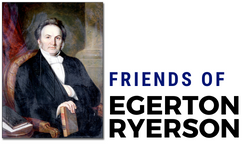Ryerson is recognized as the founder of the public school system in Ontario, then Upper Canada, but did you know how progressive and comprehensive it was? especially compared with the elitist system in Great Britain, the “mother country,” with fee-paying schools, mainly for boys.
Ryerson brought in a school system free for all, boys and girls, plus teacher training ,a model school, museum and free public libraries. He held that, since the whole of society benefits from the education of all, taxpayers should pay for it, whether they had children in it or not. Compulsory, free schooling in England was established only in 1870 by Forster’s Education Act, which itself was influenced by Ryerson’s earlier Common School acts.
Did you know that Egerton Ryerson was recognized in his time as a friend and brother of the Mississaugas of the Credit River? Ryerson supported their goals of self-government and education for their children, to be bilingual—Ojibway and English—plus other subjects.
Did you know, again contrary to much misinformation now in circulation, that the harmful residential school system instituted by the Canadian government in 1883 bears no resemblance to the voluntary schools Egerton Ryerson supported, created by Ojibway Methodist leaders?
Note the dates: Ryerson’s involvement in the Mississauga schools long pre-dated adoption of the Indian Act, in 1876, and its amendment to establish residential schools in 1883, and further amendments to make attendance mandatory, assign the RCMP to enforce attendance, and finally to take away guardianship of their children from Indigenous parents, to give it to the principals of the schools in 1937.
Check the Constitution: Ryerson worked for the provincial government, as superintendent of Education, while the (justifiably) hated residential schools were federal.
Have you heard/read what Ryerson had to say himself about his experience of living with the
Credit River Ojibway: “I was never more comfortable and happy,” and ““they received me with affection and enabled me to embrace them as brethren and love them as mine own ,“ and referred to “the affectionate manner in which they received me, and the joy they appeared to feel on the occasion, removed all the strangeness of national feeling, and enabled me to embrace them as brethren, and love them as mine own people” (cited by Nathanael Burwash, Egerton Ryerson, 1909.
Ryerson understood the importance of language for the survival of a culture, and accordingly supported instruction in Ojibway. He, as the Ojibway themselves, understood the need for Indigenous people to be able to communicate in English to government officials.
Did you know that he made introductions for Ojibway leader Kahkewaquonaby (English name Peter Jones) to British officials, and supported the case he made?
Ryerson had been sent to the Credit Ojibway as a “missionary,” but he had already been converted to Christianity, several years earlier, by attending “camp meetings.” However, his farming skills proved to be very useful–he had worked on his father’s farm and knew about farm equipment as well as farming itself. He spent his time on economic development and teaching the children, plus such pastoral work as visiting the sick and dying.
Did you know that Ryerson was an advocate of what we would call “sustainable farming”? That was what he taught the Credit Mississaugas: crop rotation and the use of manure—the way to keep crop yields high. He later published this as a book, . First Lessons on Agriculture for Canadian Farmers, 1871.
Did you know that Ryerson supported the Ojibway in their land claims (alas, unsuccessfully) and their claim to exclusive use of their traditional salmon fishing grounds? The Ojibway wanted to adapt to European settled farming—their hunting grounds were gone and their fisheries reduced. Yet they wanted to maintain their own culture and language—Ryerson agreed.
Did you know that Ryerson nominated Kahkewaquonaby to be the Western superintendent of Indian Affairs in Canada West (Ontario)? Yes, an Indigenous person to being charge of territory under the control of the Indian Affairs Department!
Lynn McDonald, CM, is a professor emerita, a former MP and a Fellow of the Royal Historical Society
